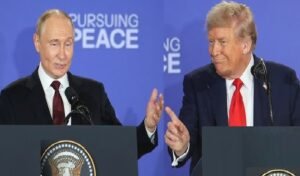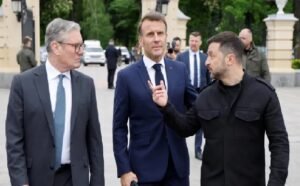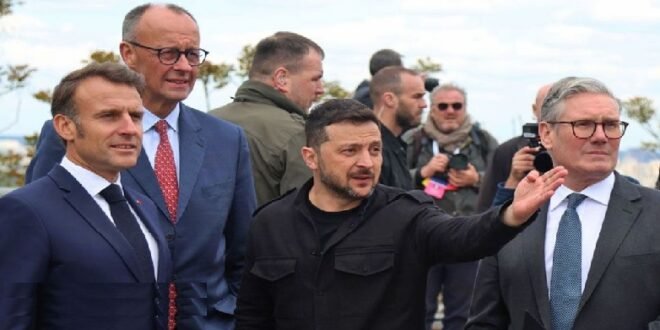20-08-2025
WASHINGTON: It is quite possible that Monday’s meeting in the White House could prove even more crucial to the future of Ukraine and for all of Europe’s security than last Friday’s US-Russia summit in Alaska.
On the surface, that Putin-Trump reunion seemed to live down to every expectation.
 There were no ceasefire, no sanctions; no grand announcements.
There were no ceasefire, no sanctions; no grand announcements.
Were Ukraine and Europe about to get cut out of a deal cooked up behind closed doors by the world’s two foremost nuclear powers?
Not, apparently, if Ukraine and its partners could prevent it.
The presence of Sir Keir Starmer, French President Emmanuel Macron, German Chancellor Friedrich Merz and other leaders alongside Ukrainian President Volodymyr Zelensky in Washington is about more than making sure he does not get ambushed in the Oval Office again, in the way he did on 28 February.
They are determined to impress upon Donald Trump two things; firstly, that there can be no peace deal for Ukraine without Ukraine’s direct involvement and secondly, that it must be backed by “cast-iron” security guarantees.
Above all, Europe’s leaders want the US president to see that Ukraine and Europe present a united front and they are eager to ensure he is not being swayed by his obvious personal rapport with Vladimir Putin into giving in to the Russian leader’s demands.
This is where the Sir Keir Starmer’s diplomatic skills will be sorely tested.
Trump likes Sir Keir and listens to him, and in a month’s time Trump will be coming to the UK on a state visit.
He also likes Mark Rutte, the NATO secretary-general who will be in attendance, a man who is sometimes called “the Trump Whisperer”.
 The US president appears to be less fond of Macron and the White House was sharply critical recently of his intention to unconditionally recognize a Palestinian state at the next UN General Assembly.
The US president appears to be less fond of Macron and the White House was sharply critical recently of his intention to unconditionally recognize a Palestinian state at the next UN General Assembly.
For a peace deal in Ukraine to have any chance of working, something has to give.
European leaders have said frequently that international borders cannot be changed by force and Zelensky has said time and time again he will not give up land and besides, Ukraine’s constitution forbids it but Putin wants the Donbas, of which his forces already control around 85%, and he has absolutely no intention of ever handing back Crimea.
Yet as the former Estonian PM and now Europe’s top diplomat, Kaja Kallas, once said to me; victory for Ukraine in this war does not have to be exclusively about reconquering occupied land.
If Ukraine can obtain the sort of Article 5-type security guarantees now being talked about, sufficient to deter any future Russian aggression and thereby safeguard its independence as a free and sovereign state, then that would be a form of victory.
It does now appear that what the US and Russia have been discussing is a proposal that broadly trades some Ukrainian land for security guarantees that it will not have to give up any more to Russia but the question marks are huge.
Could Ukraine accept a deal that ends the war but costs it land, especially when so many thousands have died trying to save that land?
If it is asked to give up the remaining 30% of Donetsk Oblast that Russia has yet to occupy then does that leave the path westwards to Kyiv dangerously under-defended and what of Sir Keir’s much-vaunted Coalition of the Willing?
Earlier talk of deploying tens of thousands of boots on the ground have since been scaled back. (Int’l News Desk)
 Pressmediaofindia
Pressmediaofindia




